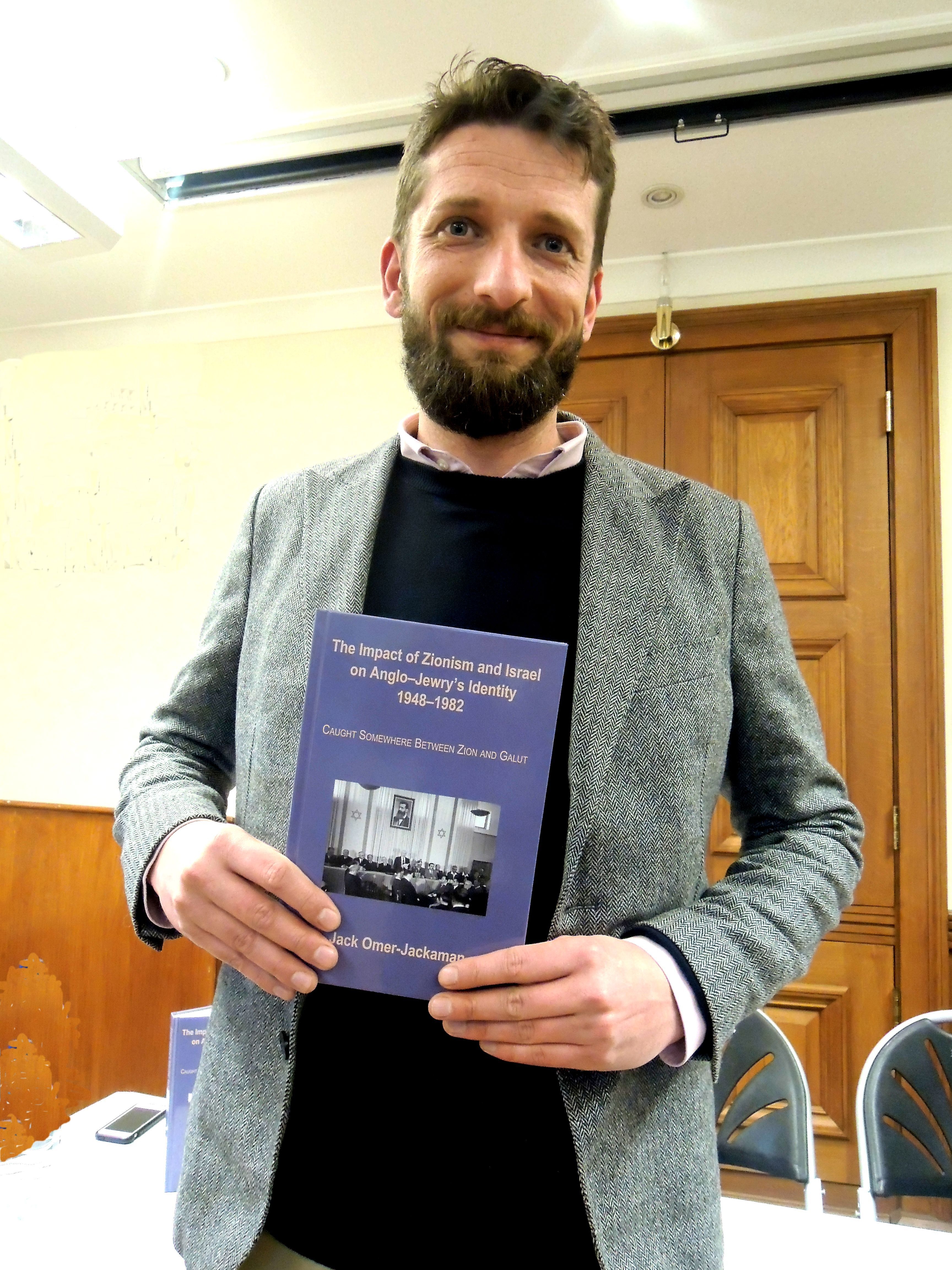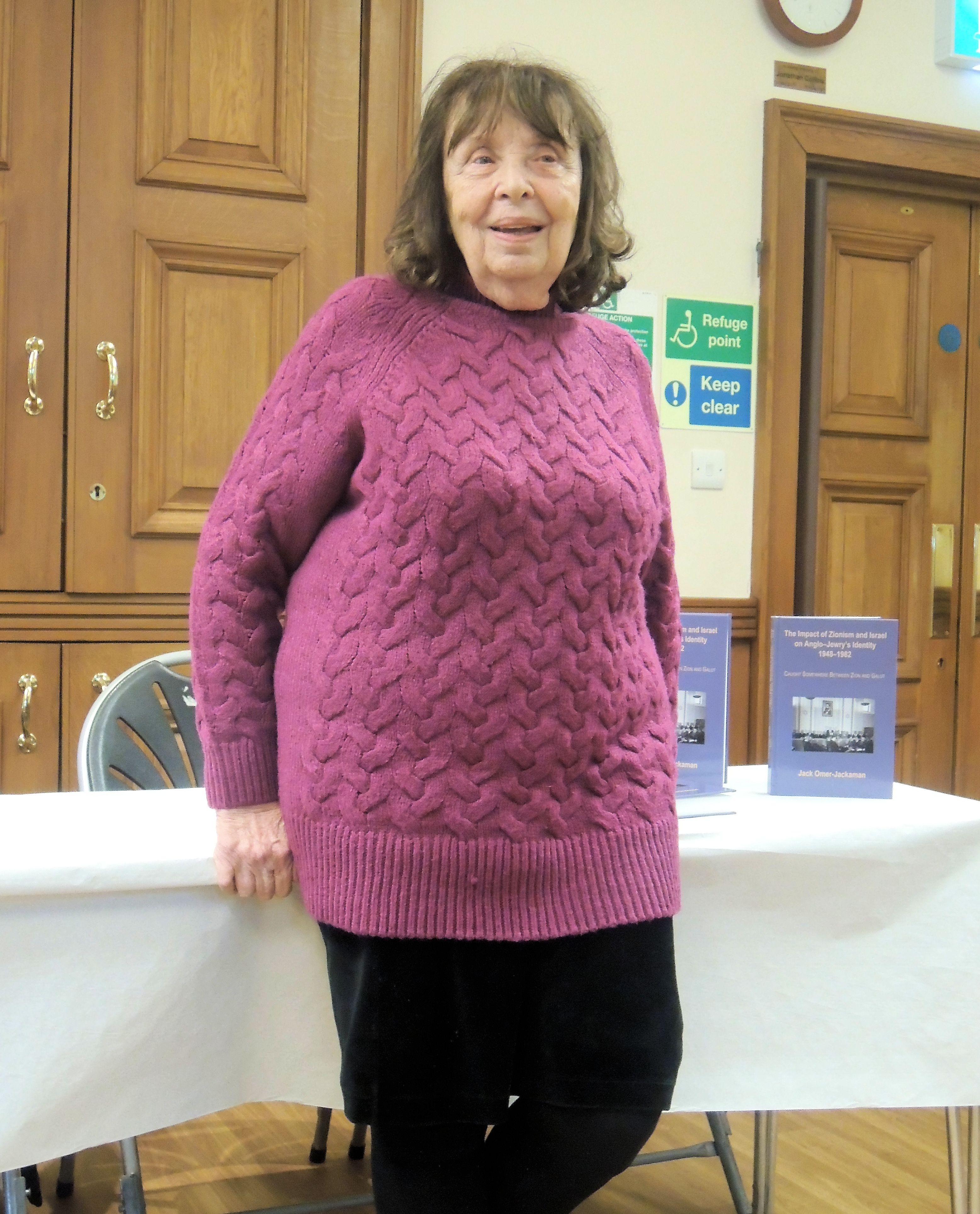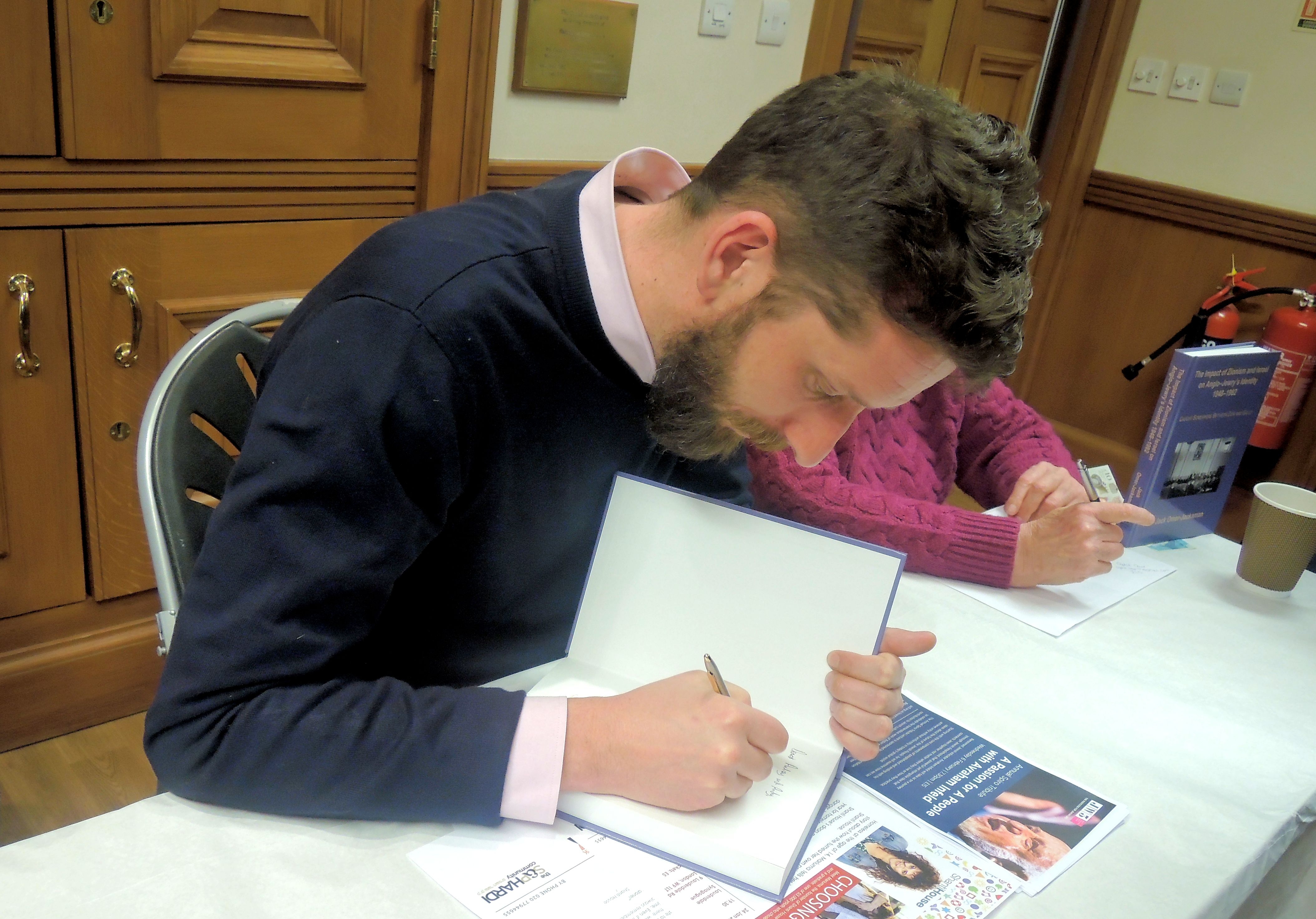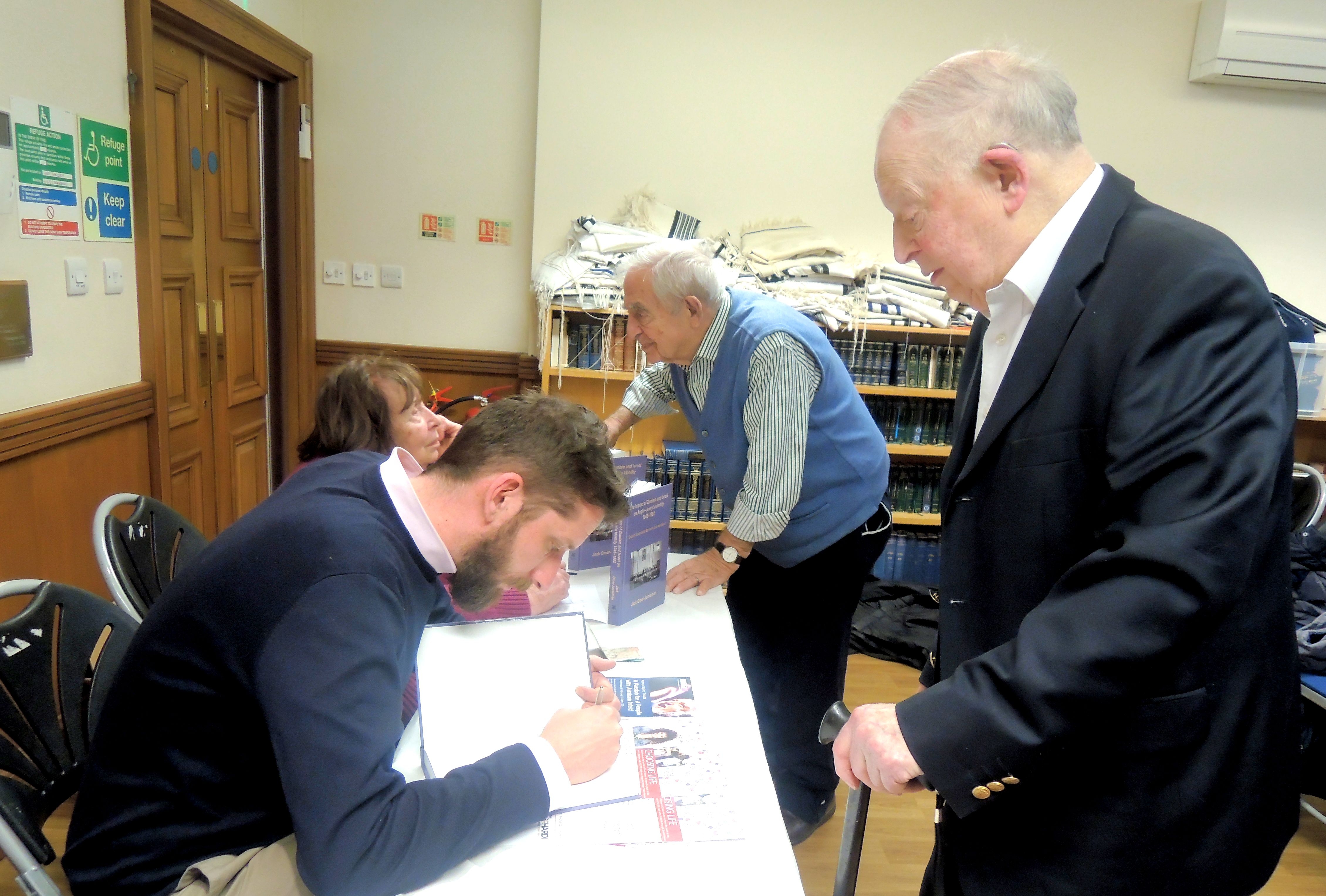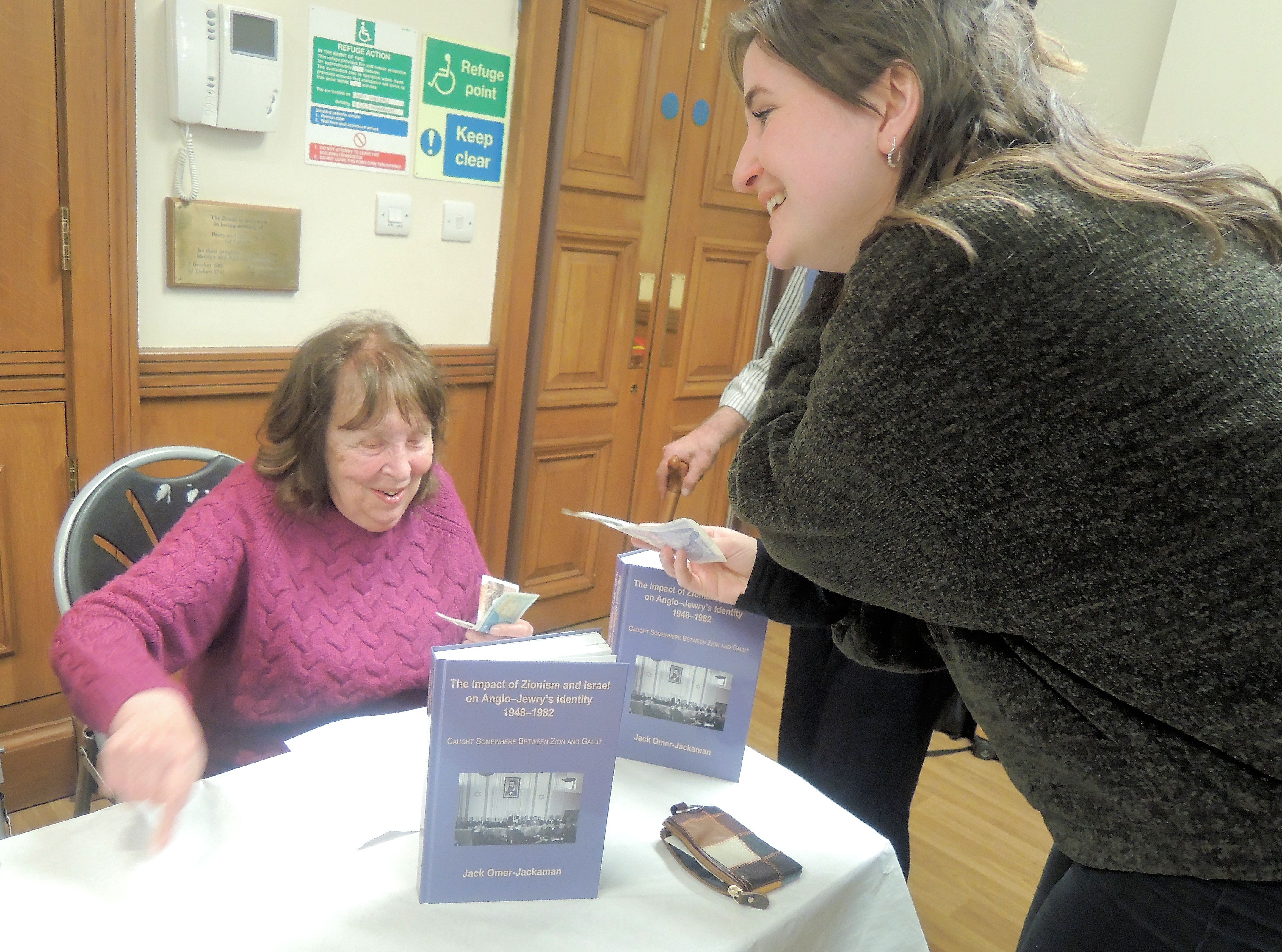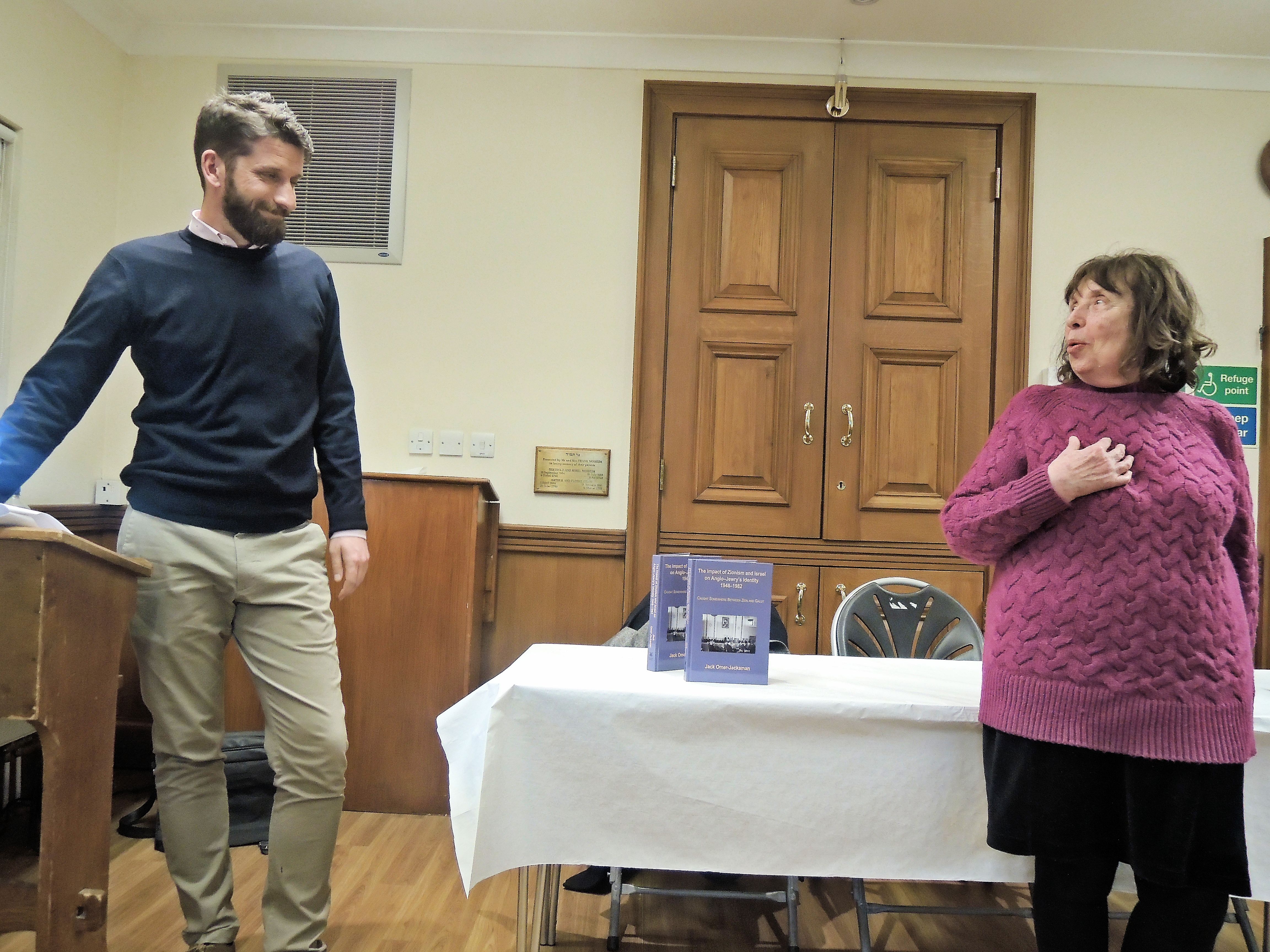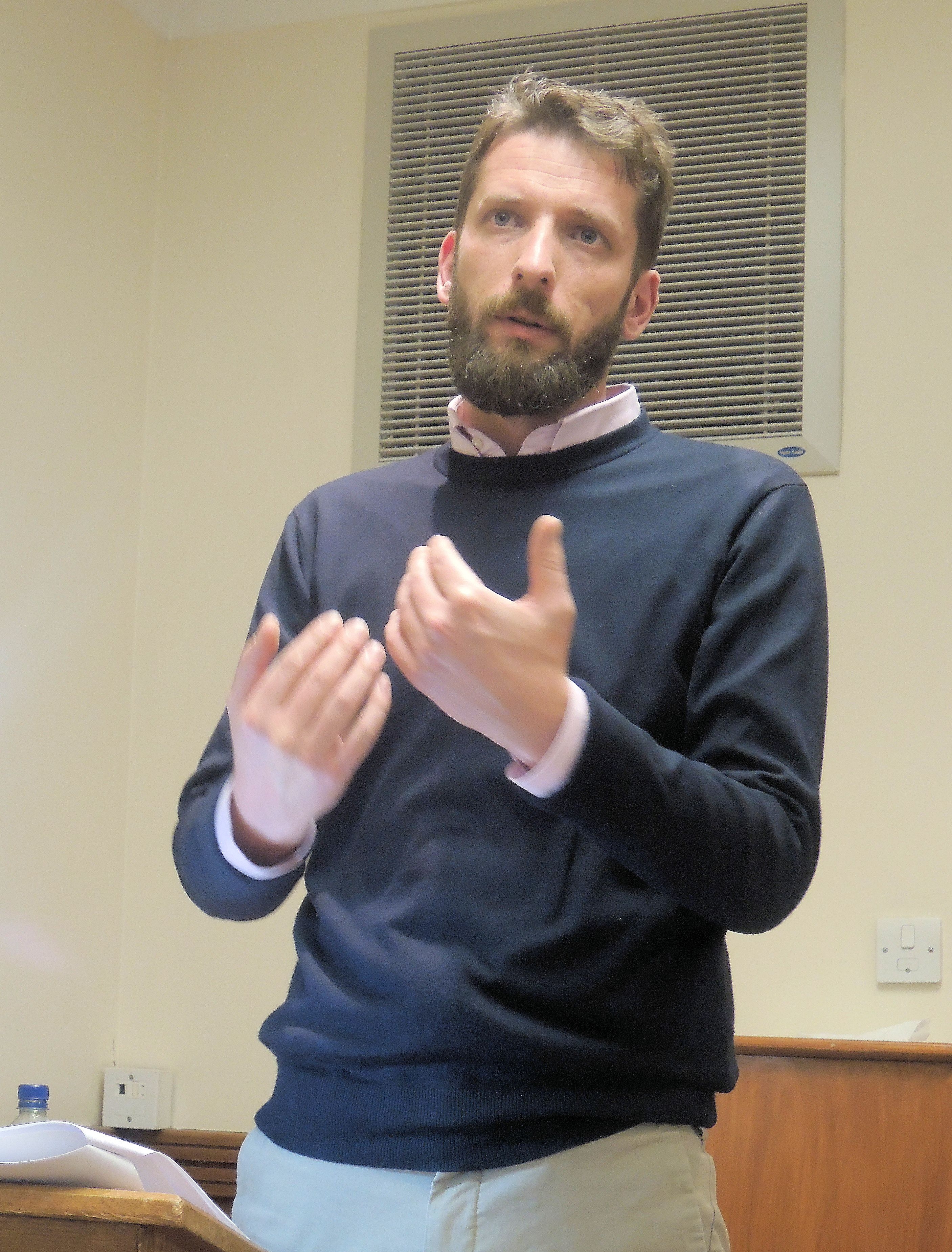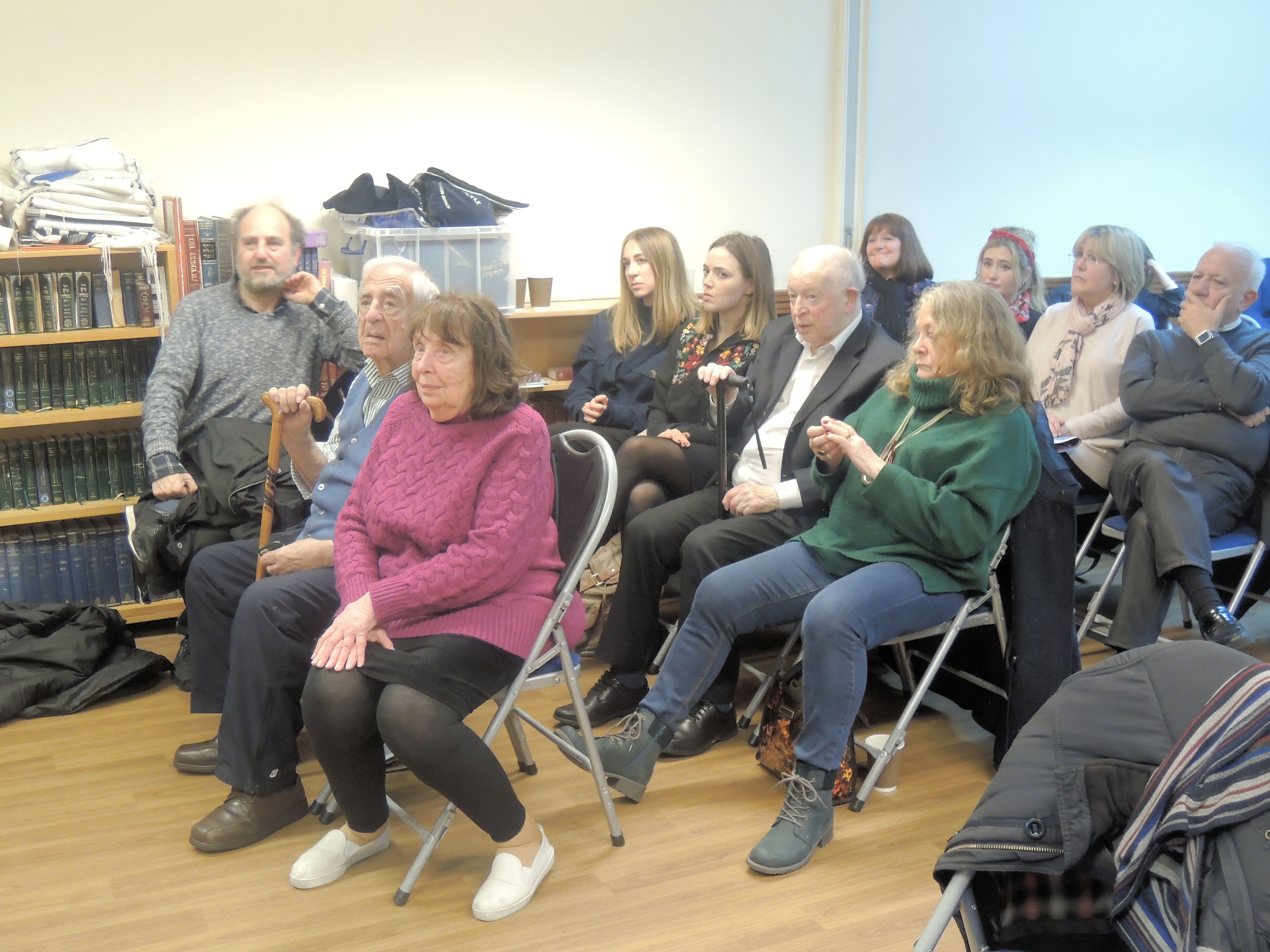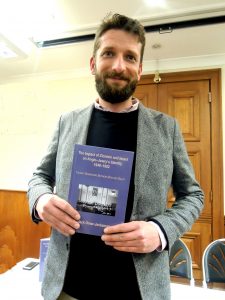
Photo by: Maurice Hoffman
Last week we had a fantastic book launch of The Impact of Zionism and Israel on Anglo-Jewry’s Identity, 1948-1982: Caught Somewhere Between Zion and Galut – by Jack Omer-Jackaman.
It was a very pleasant and educative event in which the author revealed fantastic research he has done on the topic. This book is surely a must read if you want to understand all the new answers and fluctuations of the polarized attitudes of the Anglo Jewish community to Zionism.
IT is the most comprehensive study on the topic. Jack Omer-Jackaman, not being a Jew, has been especially conscious of his duty to present a truthful and objective picture. As he came from the outside world with no preconceived ideas his research is meticulous and accurate. A must for anyone who has even a vague interest in the topic.
Below is the lecture by Dr Omer-Jackaman:
1.
Thank you Nitza for that warm welcome and to all of you for braving the cold and coming out to celebrate the launch of this book. I shall quote my academic hero, the great Yehuda Bauer, who often opens a lecture using a line he imagines Henry VIII might have said to his many wives- “rest assured, I don’t intend to keep you too long!”
I think it wise, in these troubled times to establish some ground rules both for this talk and for the spirit of my book. They are not ideological or
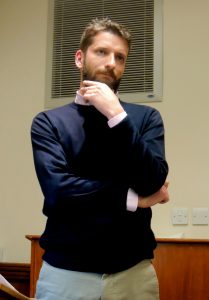
Photo by: Maurice Hoffman
political considerations of Zionism or Israel and their virtues or sins; Lord knows that particular field is crowded enough these days. Of course, the historian is foolish if they claim to be entirely free of bias- what else is archival research but a choice of one set of sources over another? Nonetheless, my book aims for a tone of disinterested analysis. Indeed, I hope you will find it refreshing that- for tonight at least- Zionism, and its effects and manifestations in this country are phenomena for careful observation rather than wounding political point-scoring; I know I will! Perhaps it is also a relief that we can have one night of from talking about Brexit!
The spirit in which I conducted my research is also in part guided by my status as a non-Jewish historian of the Anglo-Jewish community. I consider this an extraordinary privilege deserving of respect and sensitivity. As a researcher I was a guest in the community and in the annals of its history, and I take this responsibility very seriously. This story, although I have told some of it, is not mine. I think this especially important given that, to many, this is not some tale from long ago, but lived experience. I must acknowledge however, that my attempt at detachment does not mean that some of the ideas expressed by British Jews in the recent past, that
2
you will hear tonight, are not themselves controversial and troubling to a modern audience. The historian, their attempt at sensitivity notwithstanding, must go where the evidence takes them.
So, with that caveat in mind, onto the substance. My research started out, as these things often do, with a basic question: namely, in what ways did Zionism and the State of Israel affect how it felt to be a British Jew in the first decades after the establishment of the state in 1948.
This starting question dictated that I was as interested in thoughts and feelings as I was in actions. The concept was attractive both for its inherent interest, but also in that there seemed to have been little work done looking at this question. Existing literature assumed, rightly, that Israel had had a profound impact on the life of British Jews. But rarely did it explore this with much depth and nuance.
My book, although it tries to address this gap, only scratches the surface. It should in no way be seen as the last word on the subject; indeed, I hope it comes to function as a ball which other writers can pick up and run with. I do not cover everything, by any means. So rich is the story that a single volume of this length could not hope to. In the rest of the lecture I will take you on something of a whistle-stop tour of the major themes and issues discussed in the book. It will give you just a flavour, and I quite selflessly encourage you to read the book for the rest!
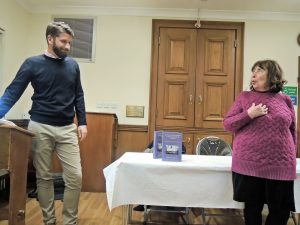
Photo by: Maurice Hoffman
I used what I hope is a somewhat novel chronological-thematic structure, whereby I looked at specific issues within specific timeframes. So, you will hear about debates on Israel’s implications for Anglo-Jewish citizenship in the late 1940s and 50s; about the impact of Holocaust awareness on the development of identification with Israel in the 60s; about the unifying and galvanising effects of the Six Day War; and finally about the opposite of this; of Zionism and Israel as divisive communal phenomena
3
following the growth of right-wing Zionism in the 1970s and the 1982 invasion of Lebanon.
The era immediately following the achievement of Israeli statehood was clearly one of adjustment for British Jews. All that had been hoped for by British Zionists, both activist and armchair, had been achieved, and the Jewish State was now a reality. However, this was not an uncomplicated transition. Nor, pre-1948, had Zionism attracted universal support within Anglo-Jewry. Indeed, a great many prominent and vocal Jews argued against it.
The arguments between Zionists and what I have called the civic anti and non-Zionists by no means vanished after 1948, where traditional historiography tends to leave the story. The rationale which fuelled these Jewish opponents of Zionism can really be summed up in the words “dual loyalty”. They interpreted Jewish emancipation and the maintaining of favourable conditions for Jews in a non-Jewish society as being dependent on demonstrating to non-Jewish opinion that Jewish loyalty to the nation superseded loyalty to the Jewish collective. In other words, it somewhat accepted the power of the centuries old antisemitic canard that Jews were a self-elected “people apart”, whose fundamental otherness made them unsuitable for full membership of the nation, and tried gently to refute it.
Even non-Jewish champions of Jewish emancipation often seemed to accept the basic logic of this antisemitic notion. When the Jews’ great advocate in revolutionary France, Clermont Tonnerre, said in 1789 that the new France must ‘refuse everything to the Jews as a nation and accord everything to Jews as individuals’ and ‘refuse legal protection to the maintenance of the so- called laws of their Judaic organization’ what he meant was that emancipation would make Jews equal citizens but that in return Jews must forego collective Jewish national bonds and representation and belong only to the nation of France.
4
Despite the fact that British emancipation proceeded in a less dogmatic and rather more classically British laisez faire fashion, multiple generations of well-established British Jews accepted the basic thrust of the argument, went to great lengths to stress their patriotic loyalty to Britain, and believed that British emancipation and integration constituted a great Jewish success story.
Therefore, when it emerged in the late nineteenth century, Zionism seemed to them an alien and dangerous idea. Not only did it advertise itself as a

Photo by Maurice Hoffman
solution to a failed emancipation that these Jews simply didn’t see as applying to their experience. It also appeared to have grave implications for hard-won British citizenship and integration. Here was an ideology which said that Jews were not simply a church but a nation and that all Jewish energies should be marshalled towards a territory for a Jewish state. Would this not undo all the hard work of the emancipation? Would not non-Jews now revert to the pre-emancipation understanding that Jews could never be loyal citizens since their true citizenship belonged to the Jewish nation instead? Antisemitic writers like Hilaire Belloc did indeed leap upon Zionism as an illustration that the Jew could not be a true Englishman.
Pre-1948, those with these concerns campaigned hard against Zionism and against their Zionist counterparts. When the so-called Zionist bloc gained control of the Board of Deputies in a gradual process between 1939-1943, it was seen not only as a victory for the right of the Zionist movement to speak on behalf of Anglo-Jewry, but also as a democratising of communal institutions; a wresting of control away from a mostly-Sephardi elite and to the more numerous and recently arrived Ashkenazim. The civic anti-Zionists regrouped in the short-lived Jewish fellowship and, later, in the Anglo-Jewish Association whose activities in the ten or so years after 1948 were rather monomaniacally dominated by the stressing of Jewish loyalty to Britain in the new era of Jewish statehood.
5
They ceased the long-standing cooperation with the Board of Deputies on the joint foreign committee since the Board was, they felt, in thrall to Great Russell street and the WZO. They also campaigned against Selig Brodetsky’s joint positions as President of the Board and the leader of British Zionism. Revealingly, while Brodetsky used the first board meeting after the Israeli Declaration of Independence to lead all deputies in a singing of Hatikvah, the AJA used its first post-state meeting to declare that Israel ‘will not possess…any jurisdiction of any kind’ over British Jews.
Needless to say, the civic non-Zionists were appalled by the explicit calls for the summary liquidation of the diaspora by that arch anti-Diasporist David Ben Gurion. Israel’s premier made clear that in the new world of the Jewish state, diaspora Jews had one job: to end their parlous, degraded exile in favour of a true Jewish life in Israel. They were also furious when prominent British Zionists echoed the Ben Gurionist line and made calls for Anglo-Jewry to play its part in the ingathering of the exiles. Indeed, the AJA argued that the Zionist bloc was actively preparing for the dissolution of Anglo-Jewry. It accused the Board, for example, of deliberately failing to repair the Dover Jewish community’s war-damaged premises, since it hoped there would soon be no community to house, and of channelling such a high proportion of communal funds towards the Joint Palestine Appeal that certain age-old communal institutions were running the risk of insolvency.
They gave speeches with titles like ‘The Jews of Britain-Their Heritage and Responsibilities’; they protested against the wider community’s decision to honour the new Queen Elizabeth by the planting of a forest in Israel as a wildly inappropriate show of loyalty, and they targeted Anglo-Jewish youth who they felt, correctly I think, were falling for the allure of Israel’s revolution in Jewish identity, seduced by the mythic Sabra and increasingly immune to the distinctly parochial, rather 19th Century deferential patriotism of the AJA. When they failed with the young, they
6
tried the parents. In the late 1950s it was decided that the AJA needed a new slogan. I hope this is not too cruel, but when writing this passage in the book I liked to imagine the response of a modern branding consultant to the following suggestions for the slogan made by the AJA:
1) ‘For your children’s sake – if they are to remain British Jews – support the Anglo-Jewish Association’
2) ‘Make up your mind now! Do you and your children wish to remain British Jews? If so, the Anglo-Jewish Association is the only body representing your views’
3) ‘Anglo-Jewish does not mean Anti-Israel, but the Anglo-Jewish Association has as its first concern those Jews who wish to remain in this country and see the continuance of the great Anglo-Jewish traditions.’
I think it safe to say you would struggle to imagine those on a branded coffee cup or baseball cap!
What the civic non-Zionists attitude did not create, however, was public criticism of Israel. In fact, quite the reverse. In 1953, the Israelis’ elite unit 101, then under the command of General Ariel Sharon, conducted the controversial border raid at Qibya. The raid prompted much international condemnation. In Britain, Selig Brodetsky, the arch-Zionist, was furious, and let it be known that he was furious. The AJA, then under the Presidency of Ewen Montagu, said nothing, lest, by criticising the Israelis, it would show the British public that Israelis and British Jews existed in a state of civic or national kinship and were responsible one for the other. So there is an irony here.
The AJA was fighting a losing battle, and its obsession with a single Anglo-Jewish loyalty seems a little arcane today; a little too redolent of Norman Tebbit and cricket tests. Anglo-Jewry has, thankfully, never been faced with a situation like that of Jonathan Pollard and has, in general, been comfortable with a British identity in which a deep concern for Israel is complimentary, not competitive. The debate I’ve outlined however, dominated the 1950s.
7
One of the more observant AJA activists noted that one of the prime factors in their failure to convince Jewish youth to shun Zionism was the Holocaust. ‘It is unrealistic to expect the Jewish mind’, he said, ‘to be oblivious to Auschwitz, Buchenwald or Theresienstadt’. His argument was that growing awareness of the Holocaust, in conjunction with the establishment of the State of Israel, was both eroding young Jews’ faith in the security of the European Diaspora and attracting them to Zionism, whose defiant, victorious self-reliance seemed an attractive counterpoint to the Nazi genocide.
I looked at how this awareness effected attitudes to Israel and Zionism in the late 1950s and 1960s. In part I did this to try to defend the community from what I feel is the vast generalisation and simplification which prevails in much existing Anglo-Jewish historiography; namely, that Anglo-Jewry did not really confront or engage with the Holocaust until the 1970s or 1980s. This is simply not the picture that confronts the archival historian. Although engagement was not at the kind of level we might see today, Anglo-Jewry did in fact engage widely with the Holocaust in the 50s and 60s. Fascinatingly, they also tended to do so through the prism of Zionism and Israel, which were juxtaposed with the genocide, as counterpoint to it.
In a very simplistic sense, I think we can say that Holocaust awareness helped create a Zionist consensus in the period. The great Labour parliamentarian Manny Shinwell, for example, delivered a powerful speech in Parliament in 1957, in which he explained that he had always opposed Zionism on socialist, universalist, rather Bundist lines, but that the Holocaust had changed his mind.
Several members of the golden generation of Anglo-Jewish writers that emerged in the late 50s were united in the sense that the juxtaposition of calamity and renewal represented by the Holocaust and the establishment of the State of Israel was
8
responsible for the majority of their Jewish identity. ‘Auschwitz made me more of a Jew than Moses ever did’ wrote Dannie Abse in his poem “The White Balloon”.
Brian Glanville, meanwhile, wrote that Israel was ‘profoundly important to my self-respect as a Jew because it counteracts the traditional Jewish image of passivity, of suffering borne in silence.’
This is a theme, controversial though it may be, that recurred again and again in the archives and thus appears regularly in the book; the perception- and I underline this word- that the Sabra, as the personification of Israel, represented a new trend in Jewish identity away from perceived- underline again- historic passivity, towards a modern valour and self-reliance. Calls for such a transformation had, in fact, been a feature of some of the earliest Zionist texts; see Max Nordau and his “Jewry of Muscle” of 1898. This feeling was, I am afraid, particularly apparent in reactions to the Holocaust during the 1950s and 1960s.
There was a common notion, troubling to us today, which stated that Jewish resistance during the Holocaust was not of an extent which might be expected. We know now that, not only was armed Jewish resistance far more plentiful than is commonly understood, but also that, where circumstances made armed resistance impossible, Jews resisted in other ways, with such courage and innovation as to rank alongside any comparable example in human history. To take only the case of the Warsaw ghetto, they did this by the maintenance of highly organised systems of education, of culture, of healthcare, of social welfare, of religious observance- all upkept without regard to personal risk and in the face of the worst barbarism mankind has probably ever known.
In the 50s and 60s, however, the perception was that Zionism and Israel had affected a profound, self-reliant and assertive revolution in Jewish thought and deed, and that its counterpoint was the Holocaust. In mitigation for the error of this widely held
9
view, I think we can acknowledge that the sheer enormity of the tragedy naturally encouraged a certain incomprehension about how such a thing could have been possible. Nor did British Jews have access to the wonderful resistance literature we have at our disposal today.
As an example of the trend, when some Jews, Victor Gollancz most notable among them, were publicly critical of the capture and trial of Adolf Eichmann, they were attacked for embodying the type of “old” Jewish identity which had supposedly resisted direct confrontation with the enemies of the Jews, rather than the proud and unapologetic fighting spirit of Israel. Referring specifically to Gollancz, a Jewish Chronicle editorial explicitly compared his quiescence with Jewish attempts to mitigate the damage during the Holocaust. ‘Not only did this attitude fail to save them’, it said; ‘it actively facilitated their destruction. Jews have no cause to apologise for their existence, to hide their faces or remain silent about their past sufferings in order to avoid annoying the Gentile.’ A 14-year old Jewish girl also wrote in defence of the trial: ‘How else are we to prevent similar horrors?’, she asked; ‘And how else are we to let the world know that we, the Jews of the present day, are not going to be the downtrodden scapegoats our predecessors were?’
Erroneous perceptions about Jewish resistance in the Holocaust also had the effect of making those armed resistors who were known about at the time into totemic symbols of the new Jewish identity. There was particularly the case with Mordechai Anielewicz, the young leader of the Warsaw Ghetto uprising. Crucially, for our purposes, the dominant sense was not only that Anielewicz rose up, but that he rose up as a Zionist; in fact, that he rose up because he was a Zionist. So, in the popular imagination, Anielewicz personified the perceived Zionist revolution whose baton had first been grasped in Warsaw and then passed on to the new State of Israel.
10
I will give you one more example from among the hundreds I found, that of the Welsh Jewish MP Leo Abse and his speech in Parliament at the time of the now forgotten Swastika Epidemic wave of antisemitism in 1960. Again, I warn you that it is uncomfortable to modern ears. ‘When we look on the history of our people’, he said, ‘…it is not our martyrs which we regard with pride. For example, we do not take pride in the action of those Jews in York in the thirteenth century who, when surrounded by a howling mob, decided to commit suicide. The people in whom we take pride are the Judas Maccabeuses of history. We look at what happened inside Germany and in Europe. It is not those Jews who, alas, first stripped themselves, then dug their own graves and then were shot in whom we take pride. We take pride in those Jews who fought back in the Warsaw ghetto and showed that they would hit back when people attacked them. We take pride in the Jewish National Home in Israel and the fact that the people there are not quiescent about racial hatred.’
The epigram to my book is a line from an Amos Oz character who says: ‘[t]hanks to the might of Israel, even Diaspora Jews can hold their heads up high’. We may criticise, rightly, the distortions of Holocaust history which informed attitudes in the 50s and 60s, but it is very hard to refute the truth of this line for the case of the British diaspora in the first decades after both the Holocaust and the birth of Israel.
Holocaust awareness also affected the nature of the Israeli-Diaspora relationship in the period. At a conference in 1959, Ben Gurion clashed with the great Anglo-Jewish historian Cecil Roth. How could the Diaspora not have learned from the Holocaust, said the Prime Minister, that diaspora life was untenable, and that the only logical conclusion to draw was that Israel should be the home for all the Jews of the world? Roth responded by arguing that Zionism was certainly the answer for those communities who suffered from ineradicable gentile antisemitism, but that it was ridiculous for Ben Gurion to treat the British or American Diaspora as though it were
11
the Polish or German variant. ‘England has been our mother’, he said, not a ‘cold stepmother’.
Ben Gurion was not alone however. When the JC sent correspondents to Israel in the period, they noted how Israelis’ Holocaust awareness, especially young Israelis, led them to the same conclusions as Ben Gurion. Thus, while the Holocaust seemed to lead British Jews to a closer identification with Israel and Israelis, the sense was that this was not much reciprocated.
The Holocaust also greatly informed reaction to the Six Day War. I find that that long, long week in June 1967 was not only one of the most collectively traumatic in the history of Anglo-Jewry but also that it forever altered the centrality of Israel to Anglo-Jewish identity. I agree entirely with the late and much-missed David Cesarani that the war was the point at which Zionism replaced Judaism itself as the unifying force in Anglo-Jewry.
If you read accounts from the period immediately prior to the Six Day War, you find that Anglo-Jewish leaders, both religious and secular, felt the community to be at a crisis point, with bonds of Jewish identification weaker than perhaps at any point in the community’s history. Synagogue attendance was at an all-time low, as were levels of participation in secular Jewish organisations. At the university level a worryingly small percentage of the Jewish student population took part in Jewish societies, while the new Chief Rabbi was particularly alarmed that Jewish intellectuals were almost entirely divorced from Jewish concerns.
Antisemitism was, rightly or wrongly, regarded as being at a record low, meaning that there was not that impetus for communal solidarity that external hostility can often stimulate. Instead, Anglo-Jewry was living through what Lionel Blue called the ‘uneventfulness of normalcy’. Chaim Bermant’s concise summation of the problem
12
was that: ‘Jews ha[d] learned to survive oppression; c[ould] they survive freedom?’ The community was thus felt to be experiencing an acute crisis of identity with potentially existential implications.
It was this status quo that the Six-Day War would rupture. Almost overnight, there was a profound transformation in levels of activism and positive identification. ‘We discovered then’, observed Rabbi Michael Goulston, ‘viscerally, emotionally, and super-rationally that we belonged to one people, that the problems of identity could be solved in a moment of total involvement. As the novelist Lionel Davidson put it: ‘It was as though in a thousand places an identical muscle had involuntarily twitched.’
There was a sense that only when the Jewish State was facing a possibly terminal threat, did British Jews realise quite how dear to them the country was, quite how imperative it was to their sense of themselves as Jews. On the eve of the war, the Chief Rabbi commanded that all British Jews make any sacrifice necessary for the sake of Israel in her hour of need. He urged all Jewish households up and down the land to recite psalms 83, 122 and 125 and to implore the almighty to deliver the Jewish State’s vouchsafing.
The community’s efforts on Israel’s behalf were indeed extraordinary. The Keren Haysod, for example, raised £17 million from 100,000 donors in 1967, compared with £2 million from 20,000 in 1966. Orders went out from the Board of Deputies that all private celebrations, weddings, birthdays etc be postponed and the money allocated to them be given to Israel instead. The Israeli embassy recalled the ‘odd, shabby man’ who arrived with a box containing the enormous sum of £8,000, and the group of taxi drivers who donated the proceeds of their mutual aid fund. Some members of the FWZ wished their giving to as personal as possible. Thus, some gave each week the same amount it cost to keep their own children.
13
Anglo-Jewry also provided more young volunteers to the Israeli war and post-war effort than any other diaspora country. ‘Bravo to our Jewish youth’ wrote one older member of the community. ‘We can no longer accuse them of being lazy, long-haired, “pop”-crazy teenagers. They have all accepted their Jewish responsibilities with outstanding zeal.’ As impressive as the enthusiasm was, it often proved temporary as the reality of the Israeli experience clashed with their expectations.
The Israelis themselves were often unhappy with the conduct and mentality of the British volunteers. One official lamented ‘adventuristic’ British Jews ‘who were not ready for the experience’. Another observed that the volunteers ‘do not subscribe to the ideal behind doing a good job with their hands. To them fruit picking and manual labour is often just so much drudgery.’
So, again, as with the Eichmann trial, this upsurge in Anglo-Jewish identification with Israel and with Israelis was not always reciprocated. Some Israeli observers made this explicit; Sabras were “new” Jews who had shrugged off the negative baggage of the Jewish past. Their Anglo-Jewish visitors were “old” Jews stuck in old Jewish modalities. ‘There is no place in Israel’, wrote an Israeli observer, ‘for the Anglo-lokshen-soup Jew who thinks Judaism is making speeches and mutual back-patting on committees. The Judaism of Israel is not that of the United Synagogue in a comfortable London suburb.’ There was, then, a growing cleavage, from the Israeli perspective, between Israeli and Diaspora Jewish identity.
If the mood before and during the war was one of fear for Israel’s destruction, then the communal emotion resultant from the Israeli victory was one of joyous release. The successful Anglo-Jewish playwright and screenwriter Wolf Mankowitz summed up the euphoric galvanising effect the Israeli victory had on the Anglo-Jewish psyche. The community had, he said, ‘watched the unfolding of an epic of biblical proportions.’ The star of this epic was undoubtedly Moshe Dayan, who quickly
14
became a figure of mythic proportions. 10,000 photographic portraits of him were sold in London, stone busts of his image were made and sold, while the JC reported that ‘the newest rage among children is the Moshe Dayan black eye-patch.’
To some, this extraordinary week marked an irrevocable turning point in which the terms of Anglo-Jewish identity were now proscribed and inflexible. Mankowitz admitted to having previously ‘been a little confused about how Jewish’ he was. In the space of a week, however, he ‘knew with pride and happiness that I too, had returned with Moshe to the Wall- that today I am a Jew.’ Further, he wrote, ‘From this time on those who want to remain Jews must intensify their links and their identification with Israel. The Jews must finally become one people…After this unforgettable week it is my absolute belief that those who do not stand by Israel should be given their quittance as Jews. From this time onwards neither we nor the rest of the world should regard them as such.’
There was thus only room for one future Anglo-Jewish identity; one with Israel at its centre. Lionel Davidson made near-identical demands to those made by Mankowitz, his philosophy neatly encapsulated in his prescription for all Jews to undertake a ‘mental, a spiritual aliyah’: to be proxy Israelis if they were not prepared to commit to actual emigration. Similarly, Lord Sieff argued that after the war ‘As for a Jew who declares that he is anti-Zionist… I simply do not believe him.’
The Holocaust was once again a crucial factor. The victory represented perhaps the culmination of what I have previously described as Israel functioning as partial negation of the genocide and the diaspora conditions which led to it. Again, unfortunately, the proud, millennia-old record of Jewish resilience was forgotten. Asked for their response to the war, one 19 year-old from Forest Gate said ‘I think the war has shown the world that Jewish people can stand up for themselves’; a 24
15
year old from East London said: ‘the war has made me more proud of being Jewish. People used to think Jews were cowards, but they don’t anymore’.
Perhaps the most profound example was that of Rabbi Leslie Hardman. Present at the liberation of Belsen, he had spent much of his subsequent life pre-occupied with the Holocaust, haunted by Jewish helplessness, and consumed with hatred of Germans. However, come the Israeli victory, Hardman was ‘transformed by the events…No longer could I think in terms of the past… the restoration of our former glory was at hand…I realised why God had performed these miracles for us and not our forebears.. He was waiting for us to go into action…I don’t think of Germany any more… I don’t mourn the six million dead anymore.’
The Israeli-Diaspora tensions I mentioned perhaps explain why the Israeli desire for the war to act as a catalyst for Anglo-Jewish aliyah was not more successful. British Jews had always been particularly sought after immigrants for the Israelis, both for their high levels of education and technological skill and also since they represented a ‘mark of esteem’ for Israel, and ‘a step towards the aristocracy’. Both the Israelis and the organised Zionist movement in Britain therefore coordinated a large aliyah drive in the couple of years after the war. This was largely unsuccessful. Although there was an increase on the years before 67, the proportions remained very small; much less than, say, the post-Six Day War levels of aliyah from France. Rabbi John Rayner perhaps summed it up best at the time when he wrote that ‘[w]hile most British Jews are willing to pray for the ingathering of the Exiles, they are not willing to be gathered in.’ Some young people found themselves torn by feelings of obligation and their love of Britain. ‘Aliyah hangs on my mind as the right thing to do’, said one, ‘but I can’t uproot myself more than ten miles.’ ‘I couldn’t leave my family and I don’t want my
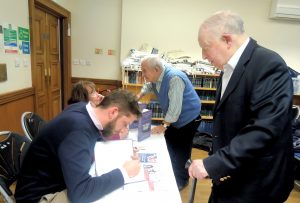
Photo by Maurice Hoffman
children to be Israelis’, said another.
16
There were limits to the fervour then. Nonetheless, for the period of the war and for the couple of years after it, Zionism and Israel functioned as incredibly unifying and galvanising forces for Anglo-Jewry.
However, while identification with Israel remained hugely important, the situation in the 1970s and early 80s became much more complicated, and Israel and competing Zionist visions became sources of fracture and dispute. In part this was a product of that fact that it started to become clear that the occupation of the territories gained in 67 was not a temporary emergency measure but looked likely to be long lasting. This in turn stimulated greater visibility for the Palestinian cause along with its championing by the nascent anti colonial or new left.
This new trend naturally filtered to the wider British culture, especially at the universities, resulting not only in a climate in which public identification with Israel by British Jews became much more problematic, but also in the creation of a new generation of young Jews who interpreted Zionism and Israel more critically than hitherto. This in turn stimulated, and was then affected by, the rise of a right wing or revisionist Zionism which, again, had largely been previously absent- or at least dormant.
Pre-state, Britain had something of a revisionist scene. Jabotinsky himself was based here for a while. The one time editor of the Jewish chronicle Ivan Greenberg combined, ironically, a rather firebrand revisionism with a deferential respect for the same anti-zionist grand duke class that we heard about earlier. It will illustrate how slow right wing Zionism was to gain legitimacy here however, if we consider that Greenberg’s ideology certainly played a part in ending his tenure at the community’s paper of record. In general, post state, the British Zionist scene reflected the hegemony of Ben Gurion’s Mapai in Israel- certainly the dominance of the centre and centre left.
17
The British situation also mirrors the Israeli one in the 70s, however, with the establishment and then growth of the revisionist Herut movement. The crucial difference, however, are the respective rates of respectability and acceptability achieved by the right in the two countries.
As many of you will know, the dominant figure in Israeli revisionism for over four decades was that stalwart of the Irgun and the fight against the British mandate, Menachem Begin. For a long time, Begin and the Herut movement were as anathema to the main currents of Israeli Zionism as we will shortly see they were to be to the British example. Ben Gurion’s famous aphorism about with whom he was prepared to govern in coalition was “anyone but Herut or Maki”, the communist party. Ben Gurion was also fond of comparing begin with Hitler, such was their poisonous personal history. This meant that, up until the mid-60s, Begin, Herut and revisionism were largely excluded from the upper echelons of Israeli political life.
This changed at the time of the six day war, when Prime Minister Eshkol invited Begin to join the cabinet. By the time British Herut was formed in 1970, Begin had established a wide base of support, especially amongst the disgruntled Mizrahim who felt largely excluded by what they saw as the Ashkenazi elite. He had even had a rapprochement of sorts with Ben Gurion, and was well down the path of legitimacy in Israel.
This is not the case in Britain, where Herut’s introduction was widely lamented and its activities much opposed. Some felt that ideological political Zionist organisations were inappropriate full stop, and that aligning oneself with an Israeli organisation, rather than engaging in a general non-sectarian Zionism, constituted a dangerous interference in Israeli political affairs. For many however, it was the Herut ideology, its uncompromising territorial maximalism, its ominous talk of both banks of the Jordan, and the person of Begin himself that made Herut beyond the pale.
18
It was not only the dovish Zionist far-left that opposed Herut’s establishment. The decidedly mainstream Vice President of the Zionist Federation condemned them as “ultra-right wing”. Ironically, Herutniks saw themselves as part of the same revolutionary spirit of the age which would also produce their most vociferous opponents. Their activists cut right across the wider British political spectrum. They were led, in fact, by a several times parliamentary candidate for the British Liberal Party. So it is not enough to explain the rise of Herut in Britain by reference to, say, Geoffrey Alderman’s excellent work on the gradual move of Anglo-Jewry from left to right. Rather, Herutniks were attracted to right-wing Zionism specifically. Their defining credo concerned territory. Not only were the territories captured in June 67 not to be surrendered; they were in fact to be considered a mere jumping off point for the eventual achievement of a Jewish Erets Israel.
Unsurprisingly, they clashed with leftist Zionists who were beginning to embrace territorial compromise and explore the implications of the occupation for both Jews and Palestinians. Herutniks interrupted an event with a Palestinian speaker at the LSE J-Soc, with shouts of “Begin, Begin, Begin”. Similarly, the Jewish Observer declared the opening of 1972’s annual Zionist Federation conference “British Zionism’s Day of Shame”, as Herutniks clashed angrily with young Zionist leftists. The bitterness of the mood at this conference was actually exceeded by the one in 1975, when Herutniks and leftists came to physical blows.
For its part, Herut felt that the British Zionist establishment was excluding it and keeping it off important committees for nothing more than the sin of representing an ideology which was fast making strides in Israel. Indeed, Herutniks had a favourite canard for their critics and opponents: they were said the Herutniks “trembling Israelites”, unfit for the era of new Jewish identity. This term was frequently in use in 1972 when much of Anglo-Jewry reacted with horror to the visit to Britain, arranged by Herut, of Begin himself. It is startling to see just how beyond the bale Begin was to
19
many Jews at that time; a mere 5 years before he would assume the Prime Minister’s office and 6 before winning the Nobel Peace Prize. At the time however, he was seen as not only a proponent of a reactionary and chauvinist Zionism, but as an embarrassing reminder of the days of the battle waged between the Irgun, Lehi and Stern Gang and the British mandate.
Begin was greeted with British newspaper headlines like ‘The Return of the Little Murderer’ and ‘Go Home Mr. Begin’. The JC’s editorial and opinion columns followed suit in opposing the visit, the former lamenting the damage ‘done to both Israel and British Jewry’, the latter declaring Begin as being as unfit for decent society as Oswald Mosely. Even the Board of Deputies was neutral and sent no official delegation to a dinner held for Begin. Scores of ordinary British Jews wrote to national newspapers disavowing Begin and imploring non-Jewish Britain to regard him as representative neither of Jews nor Zionism. Such Jews were in turn denounced by Herutniks as trembling Israelites, as ashamed Jews terrified of gentile opinion.
The same applied to those who did not follow Herut’s mantra of defiant communal self-defence that many felt stepped beyond the line of legitimacy and into vigilantism. Herut were encouraged in their stridency by the fact that in the early 1970s Anglo Jewry was subject to a greater amount of violent threat than is often remembered today. Britain, in fact, became something of a proxy battleground for Palestinian militants, the most notorious example being the attempt on the life of Edward Sieff, the first failed mission in the embryonic career of Ilich Ramirez Sanchez, better known as Carlos the jackal.
Less well known is the fact that in 1972 a number of ordinary Jewish citizens received crude incendiary devices in the post. It quickly became clear that what the targets had in common was the fact they had all advertised in that years Zionist yearbook. In
20
such a climate, Herut’s call for direct action, to “terrorise the terrorists” alarmed many communal leaders.
So the 70s were I think, when we can begin to see Israel become a more divisive factor in Anglo-Jewish life and when we can begin to talk not of Zionism, but of a clash between competing, perhaps mutually incompatible Zionisms. This then reaches a high point with the Begin government’s 1982 invasion of Lebanon. This represented, I think the biggest crisis in Anglo Jewry on the matter of Israel since 1948.
This is not the place to go into a detailed discussion of the war itself. The crucial point is that the invasion seemed to reverse the image and perception of plucky Israel; Israel the underdog. Israel was now portrayed as the aggressor, engaged in a war of choice, not one imposed upon her. And the self-reliant self-defensive sabra now appeared in the wider national narrative as a callous conqueror. The British press portrayed Ariel Sharon, the architect of the invasion, as “the butcher of Lebanon”. Unlike in the Six Day War, when British Jews felt the solidarity of their non Jewish countrymen, now they felt under siege.
The President of the Board of Deputies hardly exaggerated when he said that ‘our community has endured trauma and anxiety certainly unparalleled since 1948. We have felt the heat of public disapproval reflected upon us from the mirror of the Middle East. We have been bathed in the unpopularity of Israel…’ For many Jews here, especially amongst the younger generation, the Zionism of the invasion was not the Zionism which had so inspired them, which had so positively affected their identity. They were appalled by the carnage they watched nightly in this highly televised war and sought to distance themselves and their Zionism from it.
21
For the Anglo-Jewish philosopher David Conway, Jews engaging in an unjustifiable, unprovoked invasion had ‘…brought Jewry to a crossroads as momentous as any it has faced before: as momentous as the original covenant of God with Abraham; as the Exodus; the receipt of the Mosaic Law; the original conquest of the Land of Israel; the destruction of the Temples; the dispersal of the Jews; the Holocaust; the birth of modern Israel.’
The chief rabbi was also hugely conflicted, albeit mostly in private, and he wrote rather angry letters to his Israeli colleagues where he rebuked them for not understanding the difficulties this war was causing for the diaspora. Neville Sandelson MP denounced Begin in the national press as ‘a fanatical man who has led his people into a morass of worldwide odium and ignominy…Mr. Begin has exposed himself in all his basic nastiness.’
A British branch of the nascent Israeli anti-war movement “Peace Now” was started, and its activists read like a who’s who of recent Anglo Jewish academia, perhaps the most involved being David Cesarani. Like in the 70s, to the community’s defiant revisionists these anguished critics were nothing more than trembling Israelites and their disavowal of the war nothing more than an embarrassed appeal to non-Jewish Britain not to judge them.
Peace now meetings were disrupted by furious Herutniks and, as in the 70s some clashes turned violent. The letters page of every single edition of the Jewish Chronicle was dominated by pro-invasion voices attacking anti-invasion voices and vice versa. After Sabra and Shatila however, Herut stood relatively alone, with only themselves and those community leaders who preferred to keep quiet absent from the chorus of complaint. The JC officially denounced Begin and Sharon. Lord Mishcon wrote personally to Begin to say that ‘Many of us, Zionists and lovers of the people of Israel as we will always be will never forgive you.’ Lords Rothschild and Sieff signed
22
an angry letter in Ha’aretz. That a member of the Sieff dynasty, Anglo-Zionism’s ‘first family’, would be party to a public rebuke of the Israeli government, was unprecedented.
These were thus heady and disputatious days and they marked a crucial turning point in Israel and Zionism becoming internally divisive to the Jewish community. We may indeed recognise something of the mood of our own recent times in the climate as it was then.
Such are the issues discussed in the book. I hope I have illustrated, in this whistle-stop tour, that Zionism and Israel’s implications for Anglo-Jewish identity were multi-faceted, complex and often contested. That their impact was often contradictory in that they were sources of both unifying togetherness and rancorous division; of both increased Jewish confidence and Jewish anguish. I would like to finish with one of the book’s overarching, or “big” ideas. This concerns a perhaps irreconcilable point of difference between Anglo-Jewish Zionism and a certain strand of Israeli Zionism. By the very nature of its continued existence and its Zionist identity, the Anglo-Jewish community en masse has rejected the dogmatic Ben-Gurionist definition of post-Holocaust, post-State of Israel Jewish life in which only in Israel was there a Jewish future and only in Israel was there authentic Zionism.
It offered two- and only two- contrasting states of Jewish physical, spiritual existence post-1948: Israel; Zion, where a secure, authentically Jewish, authentically Zionist life was possible, and Galut, the pejorative reading of Diaspora, in which it was not. Anglo-Jewry, both in its explicit rejoinders and in its continued existence as a Diaspora community with a strong Zionist consensus identity and powerful identification with Israel, rejected this dogma, and instead tried to prove the existence of a viable third state of post-1948 life; secure, authentically Jewish, connected to Israel, Zionist, but Diaspora in residence.
23
As I said at the outset, I try to be vigilant in ensuring my status as respectful, sensitive outside observer. As such, the rights and wrongs of this particular debate are a matter for the community and not for me. I am comfortable, however, in saying that I think that the Anglo-Jewish insistence on the third way has been immeasurably to this country’s benefit. Thank you.



